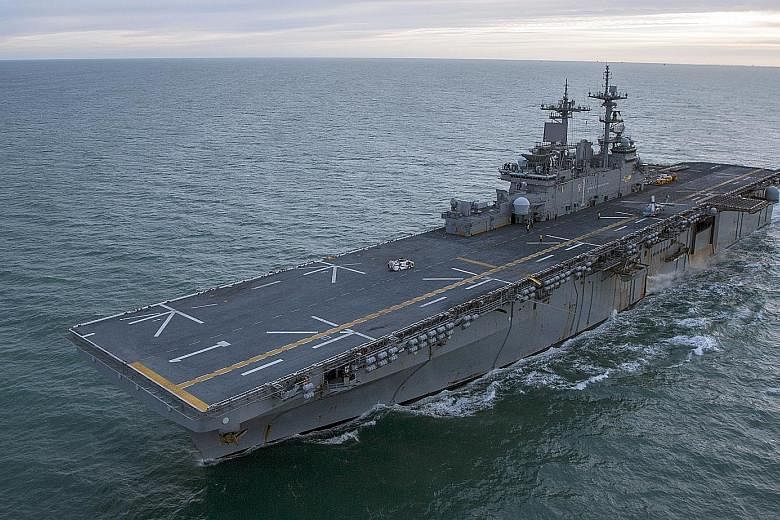BEIJING • China rejected a request by a US warship to make a port visit to Hong Kong next month, officials from both nations said, as tensions between the two countries flared on military, as well as economic fronts.
The cancellation of a planned visit by the USS Wasp, an amphibious assault ship carrying a contingent of Marines, followed China's decision to recall a senior admiral who was in the United States for a naval conference this week.
Both actions were prompted by a Trump administration decision to impose sanctions on a Chinese state military company linked to the People's Liberation Army for buying weapons from Russia.
The mounting military tensions came only three months after Defence Secretary James Mattis visited Beijing, pledging "to keep our relationship on the right trajectory".
Instead, the relationship appears to be veering wildly off track as an escalating trade war becomes conflated with broader concerns in Washington about China's policies.
The administration's actions have coincided with aggressive steps by President Donald Trump to impose tariffs on Chinese products. That has fuelled the sentiment in Beijing that the deterioration of relations was not about trade policy as much as blunting China's emergence as a world power.
China's Foreign Ministry strongly denounced the Trump administration's announcement of a new sale of US$330 million (S$450 million) in military equipment to Taiwan, the self-governing island democracy that Beijing claims as part of a united China.
In Beijing, Chinese Foreign Ministry spokesman Geng Shuang said the sale threatened to cause "severe damage" to relations with the US.
Taiwan's Foreign Ministry welcomed the sale, saying on Twitter that it would enable the island "to maintain a robust self-defence".
The US no longer formally recognises Taiwan but has maintained close relations.
China appeared even more stunned by the decision to punish the state military company.
The Trump administration announced last week that it would impose sanctions on the Chinese military's Equipment Development Department and its director Li Shangfu for purchases of SU-35 fighter jets and S-400 surface-to-air missiles from Russia.
He and the company were among 33 entities targeted under a law enacted by the US government last year to punish Iran, North Korea and Russia for behaviour hostile to the US.
In response, Beijing summoned US ambassador Terry Branstad over the weekend.
Chinese officials have repeatedly said that military cooperation with Russia - including the purchase of sophisticated weaponry - is in compliance with international law.
The US consulate in Hong Kong confirmed China's refusal to allow the Wasp to visit, but did not elaborate. "We have a long track record of successful port visits to Hong Kong, and we expect that will continue," a spokesman said in a statement.
Mr Geng deflected a question about the cancelled port visit but said China considered requests case by case, in keeping with the country's sovereignty.
Although the Chinese and US militaries have long been rivals, exchanges and port visits have been common over the years.
Such visits have nonetheless been subjected to the ups and downs in the countries' relations.
In 2016, a planned visit to Hong Kong by a US aircraft carrier, the USS John C. Stennis, was rebuffed at a time when the Obama administration was becoming increasingly frustrated with China's expansion of artificial islands in disputed territory in the South China Sea.
NYTIMES

